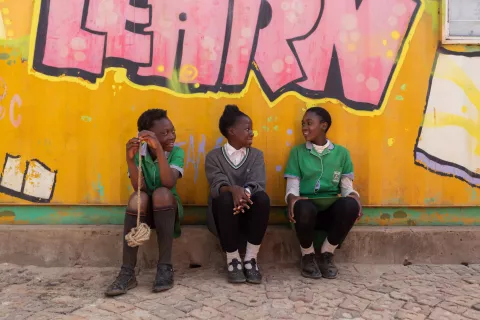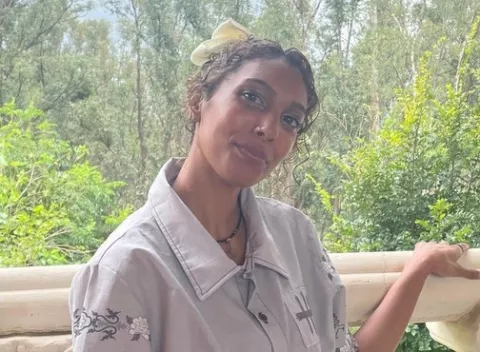60 per cent of youth needed mental health support over past year – UNICEF South Africa U-Report poll
Latest U-Report poll, released ahead of World Mental Health Day, reflects a potential improvement in mental wellbeing but significant variants between ages, not knowing where to get help and limited family level conversations point to ongoing challenges.

PRETORIA, 09 October 2023 – Some 60 per cent of children and youth felt they needed mental health support over the past year, according to the latest UNICEF South Africa U-Report poll. The findings show a 15 per cent reduction from a similar poll last year but little change among the 15-24-year-old age group, of whom 70 per cent still needed help to improve their mental wellbeing. The need for support was 5 per cent higher among respondents who identified as female compared to male.
The poll results are released ahead of World Mental Health Day, 10 October, with the theme, ‘Mental health is a universal human right’, to drive actions that promote and protect everyone’s mental health. Poll results also showed that only 63 per cent of respondents who needed support actively sought it, the primary reason for not getting help was not knowing where to go. Some 22 per cent of respondents cited family as an outlet for support but only 36 per cent have ever spoken with their caregivers about their mental health.
“Children’s wellbeing starts at home,” said Christine Muhigana, UNICEF Representative in South Africa. “A nurturing, loving and stable home environment provides the best foundation possible for a child to grow up physically and mentally healthy,” added Muhigana.
The latest youth pulse, through the U-Report poll system, also showed that 48 per cent of young respondents are most anxious about the need to build their skills for future employment, a 16 per cent jump on last year’s findings. Increased poverty due to rising living costs and succeeding in education followed as the lead reasons for worry.
Encouragingly, young people believe they are able and willing to help their peer’s mental health, with 91 per cent of respondents saying they are confident to some degree of providing support, a rise from 84 per cent in the previous year’s poll.
While much has been done to break the stigma, UNICEF continues to engage with children, young people, and caregivers to normalize conversations around mental health, including through the ‘On My Mind’ campaign.
“Increasing knowledge among caregivers about the importance of mental wellbeing for child development can improve their ability to not only support their children’s mental health but be more aware of their own,” said Muhigana. “This is especially important for emotional regulation and stress management, particularly during times of heightened anxiety,” added Muhigana.
Global research shows that the cost of delivering parenting interventions per family is roughly comparable to the cost of a routine childhood vaccination programme and can reduce the burden on health systems, improve educational achievement and longer-term economic outcomes.
The latest U-Report findings come following the two-day Regional Psychosocial Support Initiatives (REPSSI) conference, 05 to 06 October, in Johannesburg. The gathering included discussions and lessons learnt from best practices across eastern and southern Africa. The Global Mental Health Summit in Argentina also just wrapped up at which UNICEF called for increased investment in mental health and psychosocial services.
UNICEF South Africa’s support to child and youth mental health cuts across sectors to provide the most holistic response possible, including:
-
Parenting programmes, including the ‘Parenting for Lifelong Health’ package of evidence-based, cost-effective, and home-based parenting support, publications, and digital applications, such as ‘ECD Mobi’ and ‘Sinovuyo Teen Parenting’.
-
Psychosocial support and training for educators to in-turn improve support for learners, including referrals to mental health professionals when relevant.
-
Supporting the ‘Risiha Programme’, including Safe Parks, that provide psychosocial, health, education and nutrition support to vulnerable children and youth.
-
Adolescent girls’ and young mothers support network providing a safe space for young women to discuss physical and mental wellbeing.
-
Engaging children and youth through access to information and resources, such as the U-Report mental health chat bots, ChildLine SA and ‘My body, my health: my wealth’ campaign.
In support of children and young people, UNICEF South Africa calls for:
-
Increased and sustained investment in child and adolescent mental health and psychosocial support across sectors.
-
Support for parenting programmes through committed resources and effective information sharing and referral systems, including at primary healthcare facilities.
-
Ensuring learners and educators have the resources to support their mental health through quality and inclusive services and positive relationships.
-
Breaking the stigma surrounding mental health and psychosocial conditions, through promoting better understanding of mental health and taking seriously the experiences of children and young people.
The UNICEF South Africa U-Report poll received nearly 26,000 responses, with 85 per cent of those from children and young people aged 15 to 30-years.
Notes to editors:
U-Report is a platform managed by UNICEF South Africa that helps young people to have a voice on issues that matter to them and to access information, tools and services to influence positive social change.
Media contacts
About UNICEF
UNICEF works in some of the world’s toughest places, to reach the world’s most disadvantaged children. Across more than 190 countries and territories, we work for every child, everywhere, to build a better world for everyone.
Follow UNICEF South Africa on Twitter, Facebook, Instagram, YouTube and LinkedIn




